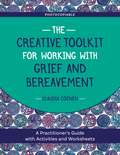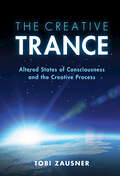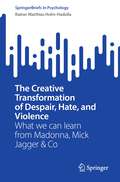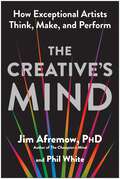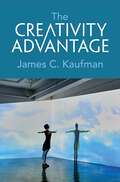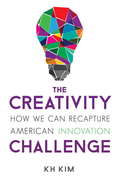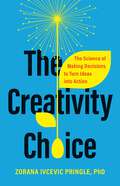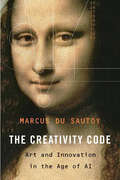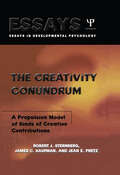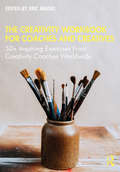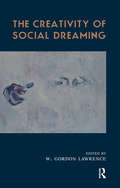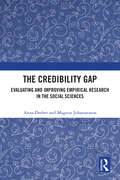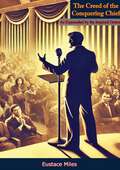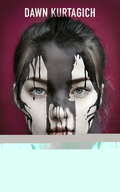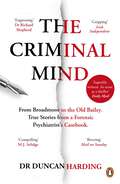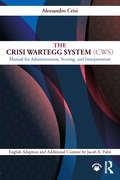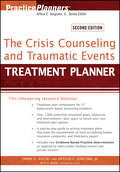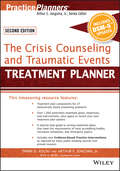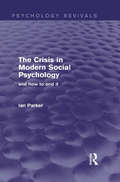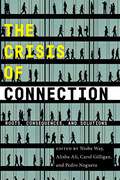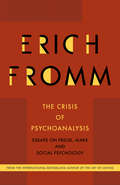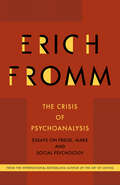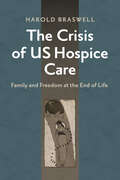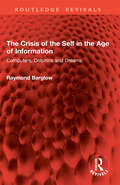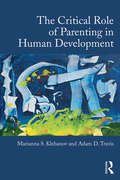- Table View
- List View
The Creative Toolkit for Working with Grief and Bereavement: A Practitioner's Guide with Activities and Worksheets
by Claudia CoenenUnderstanding loss and its effects is integral to effective counseling and support in the treatment of grief. This book is both a guide to the key theories of bereavement, and a practical workbook that can be used with clients to help them understand and work through their grief in a positive, transformative way. Divided into two parts, the first section presents current models of grief used by thanatologists, and advice on when to apply them, these models provide a springboard to deepen the conversation with clients, allowing them to discover insights, consider memories and express their pain. In the second part of the book, creative exercises encourage clients to engage with their stories and actively apply their discoveries to their own healing. Offering a straightforward guide to bereavement models and therapeutic approaches, with photocopiable exercises and worksheets, The Creative Toolkit for Working with Grief and Bereavement is a valuable resource for information on grief and how to help grieving clients, and an invitation to explore creative possibilities for healing.
The Creative Trance: Altered States of Consciousness and the Creative Process
by Tobi ZausnerIn those moments when focus on creative work overrides input from the outside world, we are in a creative trance. This psychologically significant altered state of consciousness is inherent in everyone. It can take the form of daydreams generating scientific or creative ideas, hyperfocus in sports, visualizations that impact entire civilizations, life-changing audience experiences, or meditations for self-transformation that may access states beyond trance, becoming gateways to transcendence. Artist and psychologist Tobi Zausner shows how creative trance not only operates in scientific inventions and works of art in all media, but is also important in creating and recreating the self. Drawing on insights from cognitive neuroscience, clinical psychology and post-materialist psychology, this book investigates the diversity of the creative trance ranging from non-industrial societies to digital urban life, and its presence in people from all backgrounds and abilities. Finally, Zausner investigates the future of trance in our rapidly changing world.
The Creative Transformation of Despair, Hate, and Violence: What we can learn from Madonna, Mick Jagger & Co (SpringerBriefs in Psychology)
by Rainer Matthias Holm-HadullaA creative lifestyle is not a luxury, but a necessary elixir of life. Only with creativity can we overcome despair, hatred and violence, in the world and in ourselves. Using selected examples of exceptionally creative people, Rainer M. Holm-Hadulla encourages us to unleash our own creative and social potential.Readers become acquainted with Madonna and Amy Winehouse, John Lennon, Jim Morrison, and Mick Jagger. Before wandering through their lives and work in the interplay of constructive and destructive forces, they encounter the "Big Five of Creativity": talent, ability, motivation, resilience, favorable environments. The author has theoretically researched their interaction over decades, tested them in practice and drawn the conclusion: The creative transformation of human destructiveness is our chance to lead a fulfilled life in social responsibility.
The Creative's Mind: How Exceptional Artists Think, Make, and Perform
by Phil White Jim Afremow PhDIn every creator&’s journey, there comes a stage where mental challenges are bigger than artistic ones—and it can be hard to know where to turn. This insightful book offers a rich source of mental strategies, resilience tips, and practical advice tailored specifically for creatives.No matter your medium, you know that you can&’t wait for inspiration to strike when it comes to honing your skills. This is true not only for your craft, but a crucial and often-overlooked aspect of the creative process: your mindset. From Jim Afremow, author of The Champion&’s Mind, and Phil White, co-author of The Leader&’s Mind, this new guide takes you inside the mental game of some of the world&’s top directors, photographers, writers, and musicians, and shows how their mindset has become their biggest competitive advantage. Learn from the mental game and creative process of these top artists: Destin Daniel Cretton, director of Spider-Man 4 and Shang-Chi and the Legend of the Ten Rings Chris Burkard, award-winning photographer and filmmaker BT, Grammy-nominated musician, producer, and composer Erik Larson, New York Times bestselling author of The Devil in the White City and The Demon of Unrest Dom Streater, fashion designer and winner of Project Runway and Project Runway All-Stars Tim Allen, animator for two Academy Award–winning films, Pinocchio and Peter and the Wolf Keegan Hall, artist and philanthropist Suzannah Bianco, Olympic gold medalist and Cirque du Soleil performer Stephen Wiltshire, architectural artist Graham Thompson, founder of Optimo Hats Ashley Stegon, visual artist for The Mandalorian David Greusel, architect and cofounder of Convergence Design Filled with motivating stories and hard-earned advice, The Creative&’s Mind will equip you with powerful tools to maximize your potential, persevere through hard times, and leave a lasting legacy.
The Creativity Advantage
by James C. KaufmanCreativity is usually seen as a good thing, but why? The Creativity Advantage first offers an overview of creativity studies with an emphasis on the little-discussed benefits of being creative. These include how creativity can lead to self-insight, help people heal, forge connections with others, inspire drive, and enable people to leave behind a meaningful legacy. Written in an engaging style and illustrated with interesting anecdotal material, this book offers a new perspective on creativity scholarship that can serve as an introduction to the field for newcomers or as a way to encourage new avenues for research.
The Creativity Challenge: How We Can Recapture American Innovation
by Kh KimAmerican creativity has steadily declined since 1990. That disturbing trend recently came to light through the work of leading educational psychologist KH Kim, a recognized expert in creativity assessment. In this insightful and inspiring book, Kim discovers the causes of the decrease in creativity and proposes methods of recapturing American creativity in education, in industry, and throughout every sector of society. Through the life stories of innovators, Kim debunks the assumption that creative people must be born with innate talents. She shows how parents, educational methods, and cultures shaped innovators' creative expression. As her research clearly indicates, cultural climates and attitudes (including over-reliance on standardized testing) often work against innovation unless creativity is deliberately grown and developed. Culminating over twenty years of extensive research, Kim has devised original models to identify creativity in people and organizations and help it to blossom. Gardening metaphors illustrate simple but powerful steps to transform creative potential into innovation. She emphasizes practical steps to cultivate creative climates (environment) in schools, in homes, and at work; nurture creative attitudes (personality) toward learning, work, and life; and apply creative thinking skills. Kim's models for creativity are complemented with evidence-based methods to learn and practice creative skills in everyday life.From the Trade Paperback edition.
The Creativity Choice: The Science of Making Decisions to Turn Ideas into Action
by Dr. Zorana Ivcevic PringleA &“groundbreaking&” (Marc Brackett) correction to the myth that creativity is a trait that you&’re born with—instead, a Yale scientist proves, creativity is a decision that you make again and again Anyone who has ever participated in a brainstorming session will know that most of us do not lack ideas. Yet, many people never breathe life into these ideas. To turn inspiration into real achievement, you must decide to act—and then decide to act again and again, despite obstacles, until your thoughts take shape and come to life. This is what psychologist Zorana Ivcevic Pringle calls the creativity choice. Drawing on decades of research into the science of creativity, The Creativity Choice teaches readers how to bring ideas out of your mind and into the world. With stories ranging from an entrepreneur who built a national nonprofit, to a YouTuber who turned a hobby into a professional career, to a business leader who established a company culture of innovation, Pringle illuminates how people make creative ideas happen. She shows what it takes to get started, the psychological and emotional tools needed to navigate the creative process, and the social conditions that allow creativity to succeed. Through this book, you&’ll learn how to bridge the gap between having the first spark of an idea and actually doing something with it.
The Creativity Code: Art and Innovation in the Age of AI
by Marcus du SautoyMost books on AI focus on the future of work. But now that algorithms can learn and adapt, does the future of creativity also belong to well-programmed machines? To answer this question, Marcus du Sautoy takes us to the forefront of creative new technologies and offers a more positive and unexpected vision of our future cohabitation with machines.
The Creativity Conundrum: A Propulsion Model of Kinds of Creative Contributions (Essays in Cognitive Psychology)
by Robert J. Sternberg James C. Kaufman Jean E. PretzThis book challenges traditional notions of creativity as a trait, and brings forward ideas of multiple types of creativity, along with the possibility of development of creativity.
The Creativity Workbook for Coaches and Creatives: 50+ Inspiring Exercises from Creativity Coaches Worldwide
by Eric MaiselIn this practical workbook, creativity coaches from around the world share their best exercises to help the reader meet the demands of the creative process, the creative personality, and the creative life. This book is packed with an extensive list of exercises that have been vetted by coaches working on the frontlines of creativity, and tried, tested, and proven effective with coaching clients. The hands-on activities cover a wide range of common challenges, including creative blocks and resistance, waning and lost motivation, making time for creating, the pain of disappointment, and more. This guide recognizes the connections between mental health and an alive creativity, and includes helpful advice from professionals who actively and regularly work with individual creatives on issues of process, productivity, motivation and career. Ideal for coaches and therapists, as well as creatives in every discipline, this book is a valuable aid for achieving creative realization.
The Creativity of Social Dreaming
by W. Gordon LawrenceThis broad range of papers covers different aspects of social dreaming.The book begins with a summary of the Social Dreaming Matrix conceptualised as a temporary system with its intakes, transformation processes and outputs. The remaining chapters cover social dreaming in different contexts including, amongst others, from the perspectives of art, architecture, theatre, working with immigrants, with pilots and lawyers and family mediators and hospitals.All the papers cover areas outside of the goal orientated activities of the institution, and examine what they may be saying about the organization of the participants.
The Credibility Gap: Evaluating and Improving Empirical Research in the Social Sciences
by Anna Dreber Magnus JohannessonWhich scientific results can we trust? This question has been brought to the forefront of research in the social sciences in recent years with the movement towards open science practices and preregistration. Systematic replication studies of laboratory experiments in the social sciences have found that only about half of the “statistically significant” results published in top journals can be replicated in the sense that similar results are achieved with new data. This low replicability may be even lower in studies based on observational data as such studies have more degrees of freedom in the analysis of the data leading to larger possibilities to selectively report more publishable findings.In this book, the authors provide a framework for evaluating reproducibility, replicability and generalizability of empirical research in the social sciences. They define different types of reproducibility and replicability and show how they can be measured to evaluate the credibility of published findings. Different approaches to improving the credibility of published findings, such as preregistration with detailed pre-analysis plans, Registered Report publications, and preregistered prospective meta-analysis are also outlined and discussed. Even if published results are not systematically biased, the variation in results across populations, research designs, and analyses decreases the reliability and generalizability of published findings. The book shows how such heterogeneity in results can be measured and incorporated in the analysis to more accurately represent the uncertainty and thereby generalizability of reported results.
The Creed of the Conquering Chief, As Expounded by the Inspired Orator
by Albert Lewis Pelton"The Creed of the Conquering Chief, As Expounded by the Inspired Orator" by Albert Lewis Pelton is a powerful and motivational work that distills the principles of leadership and personal success into an inspiring creed. Pelton, a visionary thinker and accomplished author, delivers a compelling guide for those who aspire to achieve greatness and lead with confidence and conviction.In this seminal work, Pelton explores the characteristics and mindset of the "Conquering Chief," a metaphor for the ideal leader who triumphs over challenges and inspires others to reach their highest potential. Through a series of eloquent discourses, the "Inspired Orator" lays out a clear and actionable philosophy for success, rooted in timeless truths and practical wisdom.Pelton's writing is both poetic and pragmatic, making complex ideas accessible and relatable. He emphasizes the importance of self-belief, resilience, and vision in the pursuit of excellence. The book is structured around key themes such as the power of positive thinking, the necessity of decisive action, and the value of integrity and perseverance.Each chapter offers profound insights and practical advice, illustrated with vivid anecdotes and historical examples that highlight the universal applicability of the principles espoused. Pelton encourages readers to embrace their inner strength, cultivate a winning mindset, and lead with purpose and passion."The Creed of the Conquering Chief" is more than just a manual for personal development; it is a clarion call to rise above mediocrity and strive for greatness. Pelton's inspirational prose and timeless teachings resonate deeply, providing readers with the tools and motivation to transform their lives and the lives of those they lead.This book is an essential read for aspiring leaders, entrepreneurs, and anyone committed to personal and professional growth. Albert Lewis Pelton's "The Creed of the Conquering Chief" remains a beacon of inspiration, guiding readers on their journey to becoming triumphant leaders and masters of their own destiny.
The Creeper Man
by Dawn KurtagichA spine-chilling psychological thriller from stunning talent and author of The Dead House, Dawn Kurtagich. Sinister and creepily atmospheric, Dawn's second YA title is sure to grip fans of Stephen King, Kendare Blake and Juno Dawson.When sisters Silla and Nori escape London and their abusive father, Aunt Cath's country house feels like a safe haven. But slowly, ever so slowly, things begin to unravel. Aunt Cath locks herself in the attic and spends day and night pacing. Every day the forbidden surrounding forest inches slowly towards the house. A mysterious boy appears, offering friendship. And Nori claims that a man watches them from the dark forest - a man with no eyes, who creeps ever closer. . .
The Criminal Mind: Gripping encounters with serial killers and true crime from Britain's leading forensic psychiatrist
by Dr Duncan HardingWHAT MAKES A MURDERER? Unraveling the Dark Psychology Behind Britain’s Most Notorious Killers From Forensic Psychiatrist, Dr Duncan HardingSHORTLISTED FOR THE CWA ALCS GOLD DAGGER FOR NON-FICTION 2025'Grips you from the start like a bestselling novel then takes you on an extraordinary journey … Riveting’ JOHN HUMPHRYS'Incisive, informative and occasionally shocking, The Criminal Mind is an engrossing book’ DR RICHARD SHEPHERD, bestselling author of Unnatural Causes'A penetrating insight into the darkest corners of the human mind. The most moving, surprising and compelling book you’ll read this year’ M.J. ARLIDGE, bestselling author of Eeny Meeny–A young girl burns down the family homeA man doesn’t remember killing his wifeA teenager’s visions and voices lead to murderOne question binds these and many others from the casebook of Britain’s leading forensic psychiatrist: Why? What drives a person to commit seemingly inexplicable crimes?Dr Duncan Harding is the person the police and the courts turn to for answers – to establish a defendant’s mental state and motivation: their fitness to stand trial.It is a career that has brought him face to face with psychopaths, taken him to the limits of human compassion and to the darkest corners of his own troubled past.This then is a journey deep into the criminal mind . . .–PRAISE FOR THE CRIMINAL MIND'Not just another forensic psychiatrist’s casebook. . . . a moving account of how Harding became a child and adolescent forensic psychiatrist, caring for mentally disordered child and adolescent offenders' KEITH RIX professor of medical jurisprudence and forensic psychiatrist‘Superbly written, as tense as a thriller, this is a book that will make you miss the bus so gripping are these cases’ Daily Mail‘Harding’s riveting memoir is often very moving … it left me with a powerful respect for all the people in the health and justice systems who put their lives on the line to keep us safe’ MAIL ON SUNDAY‘A combination of medical coming-of-age tale and true crime that is particularly gripping … Harding writes with empathy and insight … each patient a mystery to unpick’ IRISH INDEPENDENT‘A fantastic read … a very accessible window into the darker recesses of human behaviour … hard to put down’ JUDGE DAVID WILLIAMS‘Not just another forensic psychiatrist’s casebook, but a moving account of how Duncan Harding became forensic psychiatrist’ KEITH RIX, PROFESSOR IN FORENSIC PSYCHIATRY
The Crisi Wartegg System (CWS): Manual for Administration, Scoring, and Interpretation
by Alessandro Crisi Jacob A. PalmThe Wartegg Drawing Completion Test (WDCT) is a semi-structured, graphic, performance-based personality test, created by Ehrig Wartegg (1939). With a foundation in Gestalt and Psychodynamic theory, the WDCT has been used widely throughout Europe, South America, and Japan, but only recently has become available in the United States. Initial scoring systems for the WDCT were considered cumbersome and lacked research-driven validation. In response to these factors, Alessandro Crisi, following years of clinical practice and research, developed the Crisi Wartegg System (CWS; 1998, 2007), a normed and standardized administration, scoring, and interpretation system for the WDCT. Over the past three decades, Dr. Crisi has refined and expanded the CWS through research, broadening the scope of the measure, and increasing the accessibility of the system to clinicians. This manual provides a comprehensive guide to the CWS, made available to English-speaking clinicians for the first time.
The Crisis Counseling and Traumatic Events Treatment Planner
by Arthur E. Jongsma Jr. Rick A. Myer Tammi D. KolskiThe Crisis Counseling and Traumatic Events Treatment Planner, Second Edition provides all the elements necessary to quickly and easily develop formal treatment plans that satisfy the demands of HMOs, managed care companies, third-party payors, and state and federal agencies.New edition features empirically supported, evidence-based treatment interventionsOrganized around 27 behaviorally based presenting problems including child abuse and neglect, adult and child suicide, job loss, disaster, PTSD, sexual assault, school trauma including bullying, sudden and accidental death, and workplace violenceOver 1,000 prewritten treatment goals, objectives, and interventions-plus space to record your own treatment plan optionsEasy-to-use reference format helps locate treatment plan components by behavioral problemIncludes a sample treatment plan that conforms to the requirements of most third-party payors and accrediting agencies including CARF, The Joint Commission (TJC), COA, and the NCQA
The Crisis Counseling and Traumatic Events Treatment Planner, with DSM-5 Updates, 2nd Edition (PracticePlanners)
by Arthur E. Jongsma Jr. Rick A. Myer Tammi D. KolskiThis timesaving resource features: Treatment plan components for 27 behaviorally based presenting problems Over 1,000 prewritten treatment goals, objectives, and interventions—plus space to record your own treatment plan options A step-by-step guide to writing treatment plans that meet the requirements of most accrediting bodies, insurance companies, and third-party payors Includes new Evidence-Based Practice Interventions as required by many public funding sources and private insurers PracticePlanners® THE BESTSELLING TREATMENT PLANNING SYSTEM FOR MENTAL HEALTH PROFESSIONALS The Crisis Counseling and Traumatic Events Treatment Planner, Second Edition provides all the elements necessary to quickly and easily develop formal treatment plans that satisfy the demands of HMOs, managed care companies, third-party payors, and state and federal agencies. New edition features empirically supported, evidence-based treatment interventions Organized around 27 behaviorally based presenting problems including child abuse and neglect, adult and child suicide, job loss, disaster, PTSD, sexual assault, school trauma including bullying, sudden and accidental death, and workplace violence Over 1,000 prewritten treatment goals, objectives, and interventions—plus space to record your own treatment plan options Easy-to-use reference format helps locate treatment plan components by behavioral problem Includes a sample treatment plan that conforms to the requirements of most third-party payors and accrediting agencies including CARF, The Joint Commission (TJC), COA, and the NCQA Additional resources in the PracticePlanners® series: Documentation Sourcebooks provide the forms and records that mental health professionals need to efficiently run their practice. Homework Planners feature behaviorally based, ready-to-use assignments to speed treatment and keep clients engaged between sessions. For more information on our PracticePlanners®, including our full line of Treatment Planners, visit us on the Web at: www.wiley.com/practiceplanners
The Crisis in Modern Social Psychology: and how to end it (Psychology Revivals)
by Ian ParkerIn the late 1960s a ‘crisis’ erupted in social psychology, with many social psychologists highly critical of the ‘old paradigm’, laboratory-experimental approach. Originally published in 1989, The Crisis in Modern Social Psychology was the first book to provide a clear account of the complex body of work that is critical of traditional social psychological approaches. Ian Parker insisted that the ‘crisis’ was not over, showing how attempts to improve social psychology had failed, and explaining why we need instead a political understanding of social interaction which links research with change. Modern social psychology reflects the impact of structuralist and post-structuralist conceptual crises in other academic disciplines, and Parker describes the work of Foucault and Derrida sympathetically and lucidly, making these important debates accessible to the student and discussing their influence. He assesses the responses from both mainstream social psychology and from avant-garde textual social psychology to the influx of these radical ideas, and discusses the promises and pitfalls of a post-modern view of social action.
The Crisis of Connection: Roots, Consequences, and Solutions
by Edited by Niobe Way, Alisha Ali, Carol Gilligan, and Pedro NogueraUncovers the roots and consequences of and offers solutions to the widespread alienation and disconnection that beset modern society Since the beginning of the 21st century, people have become increasingly disconnected from themselves, each other, and the world around them. A “crisis of connection” stemming from growing alienation, social isolation, and fragmentation characterizes modern society. The signs of this crisis of connection are everywhere, from decreasing levels of empathy and trust, to burgeoning cases of suicide, depression and loneliness. The astronomical rise in inequality around the world has contributed to the critical nature of this moment. To delve into the heart of the crisis, leading researchers and practitioners draw from the science of human connection to tell a five-part story about its roots, consequences, and solutions. In doing so, they reveal how we, in modern society, have been captive to a false story about who we are as human. This false narrative that takes individualism as a universal truth, has contributed to many of the problems that we currently face. The new story now emerging from across the human sciences underscores our social and emotional capacities and needs. The science also reveals the ways in which the privileging of the self over relationships and of individual success over the common good as well as the perpetuation of dehumanizing stereotypes have led to a crisis of connection that is now widespread. Finally, the practitioners in the volume present concrete solutions that show ways we can create a more just and humane world. In a time of social distancing and enforced isolation, it is more important than ever to find ways to bridge the gaps among individuals and communities. The Crisis of Connection illuminates concrete pathways to enhancing our awareness of our common humanity, and offers important steps to coming together in unity, even across distances.
The Crisis of Psychoanalysis
by Erich FrommThis book brings together Erich Fromm's basic statements on the application of psychoanalytic theory to social dynamics. At the same time it offers an image of man consonant with the hopes of radical humanism. The Crisis of Psychoanalysis is a collection of nine brilliant essays. Although his work is deeply rooted in Freudian theory, Fromm further develops Freud's doctrines by including both social and ethical dimensions and applies his discoveries and insights to address the problems we face in society at large.
The Crisis of Psychoanalysis: Essays on Freud, Marx and Social Psychology
by Erich Fromm&“This book is must reading . . . although it will at times shock and perhaps even offend the sensibilities of traditional therapists.&” —American Journal of Psychiatry This book brings together Erich Fromm&’s basic statements on the application of psychoanalytic theory to social dynamics. At the same time, it offers an image of man consonant with the hopes of radical humanism.The Crisis of Psychoanalysis is a collection of nine brilliant essays. Although his work is deeply rooted in Freudian theory, Fromm further develops Freud&’s doctrines by including both social and ethical dimensions, and applies his discoveries and insights to address the problems we face in society at large. &“This collection is a fine representative sampling from a lucid, humane, always attractive writer.&” —Kirkus Reviews &“Highly recommended.&” —Library Journal
The Crisis of US Hospice Care: Family and Freedom at the End of Life
by Harold BraswellExploring the failure of hospice in America to care for patients and families at the end of life.Hospice is the dominant form of end-of-life care in the United States. But while the US hospice system provides many forms of treatment that are beneficial to dying people and their families, it does not encompass what is commonly referred to as long-term care, which includes help with the activities of daily living: feeding, bathing, general safety, and routine hygienic maintenance. Frequently, such care is carried out by an informal network of unpaid caregivers, such as the person's family or loved ones, who are often ill-prepared to offer this type of support. In The Crisis of US Hospice Care, Harold Braswell argues that the stress of providing long-term care typically overwhelms family members and that overdependence on familial caregiving constitutes a crisis of US hospice care that limits the freedom of dying people. Arguing for the need to focus on the time just before death, Braswell examines how the relationship of hospice to familial caregiving evolved. He traces the history of hospice over the past fifty years and describes the choice that people dying with inadequate familial support face between a neglectful home environment and an impersonal nursing home.A nuanced look at the personal and political dimensions that shape long-term, end-of-life care, this historical and ethnographic study demonstrates that the crisis in US hospice care can be alleviated only by establishing the centrality of hospice to American freedom. Providing a model for the transformative work that is required going forward, The Crisis of US Hospice Care illustrates the potential of hospice for facilitating a new way of living our last days and for having the best death possible.
The Crisis of the Self in the Age of Information: Computers, Dolphins and Dreams (Routledge Revivals)
by Raymond BarglowFirst published in 1994, in The Crisis of the Self in the Age of Information Raymond Barglow shows how contemporary technological environment furnish the unconscious with internal objects that hark back to a time in our lives prior to personal boundary formation and identity. The consequence is that our technological involvements help to disrupt and dismantle the ideal of the unified and sovereign self that in the past technology fostered.Throughout the book Raymond Barglow interweaves critical theory and psychoanalysis with an examination of artistic representations, media imagery and dreams to explore the conflictual dynamics of contemporary self-information and self-representation. This book is an important work for scholars and researchers of philosophy, psychoanalysis, and clinical psychology.
The Critical Role of Parenting in Human Development: Issues
by Marianna S. Klebanov Adam D. TravisThis thorough and multidisciplinary overview of childrearing illustrates and stands on two foundational principles: that the importance of parenting is immense, and that it is undervalued. The Critical Role of Parenting in Human Development surprises readers with the realization that the way we were parented in childhood impacts nearly every aspect of our lives. Based in part on cutting-edge research using MRI and fMRI technologies demonstrating that the brains of those traumatized in childhood are essentially different, the book explains that our brain development during our earliest years and in the womb is fundamental to the lives we lead. It covers attachment theory, the impact of corporal punishment on the brain, the effects of emotional abuse and neglect, and the widespread nature of Posttraumatic Stress Disorder, describing the process that leads to the transmission of parenting patterns through the generations and explaining how resulting personal issues recur throughout the lifespan. The Critical Role of Parenting in Human Development also examines laws and policies that impact parenting in our culture, making a case for their importance, and describes the effect of childrearing on various aspects of human life, including relationships, crime and violence, economics, mental and physical health, addiction, education, and career issues, among others. Interdisciplinary in nature, this book is a much-needed resource for professionals and students in the psychology, psychotherapy, social work, and related mental health and child welfare fields.
